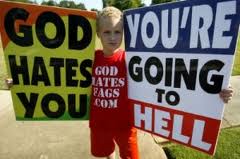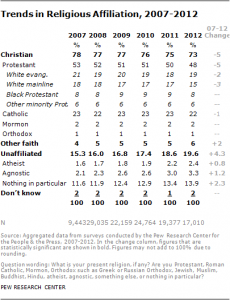
Over at the Huffington Post, contributor Wayne Besen discusses the recently observed decrease in religiosity in the US, and offers his take. According to Besen, arrogance and cruelty against gay people and their families, so common in many different denominations, are at the heart of what is happening.
Religious extremists have long claimed that the acceptance of homosexuality would bring down the fundamentalist church — and they have been proven correct, albeit not for the reasons they proffered. The downfall occurred not because gay people stopped heterosexuals from reproducing or recruited their children. It didn’t happen because LGBT individuals hate families, which they have always been part of. And it didn’t happen because homosexuals despised faith; the abundance of deeply religious gay people proves that this is not true.
The fundamentalists undermined their legitimacy by worshipping anti-gay bigotry long after it had been exposed as a false God. In this unholy obsession the sacrifices left bleeding at the altar were truth and justice. When people see their own sons and daughters and friends and co-workers coming out, it creates a crisis of credibility for religious institutions. It leads to countless situations where mean-spirited men like Nienstedt demand blind, irrational obedience and say “take it or leave it” — and more people are now following their consciences and walking away.
Besen is not the first person to offer this opinion. In a piece contributed to the BBC, another columnist, David Ellis Dickerson, had this to say, about reasons he sees behind secularization in the US:
The real issue is homosexuality.
Consider: In the early 2000s, the Barna Group—an evangelical survey organisation that has long tracked American attitudes toward religion—discovered that, almost overnight, the reputation of evangelicals had cratered.
For the first time in Barna’s polling history, Americans were more likely to view Christians negatively than positively. This attitude was especially marked in Americans aged 16-29, and so David Kinnaman, now the president of Barna, spent the next three years examining why.
When he asked these younger people what words described evangelicals, the number one answer was “anti-homosexual,” at 91%. (You can see the full survey results in his book, unChristian).
Does a closers look at the Pew data bear out Dickerson and Besen? Let’s look.
The most significant drop from 2007 to 2012 is seen among White Protestants, with “mainlines” dropping by 3 percent and evangelicals by 2 percent. Further, since there were fewer mainline protestants than evangelicals to begin with, the proportional loss of members among mainline protestant churches is even bigger than evangelicals. Mainline protestants lost one out of every six of their members in a mere 5 years. They should really be panicking.
Homophobia may well be part of the picture. But if that is the real reason behind secularization as the authors above suggest, then why is it that the less homophobic mainline protestants are losing ground faster than evangelicals? Clearly other factors must be involved, and I hope to write about those soon.

